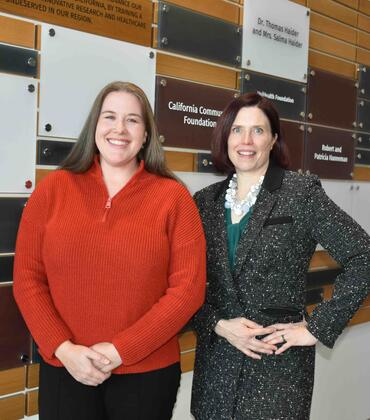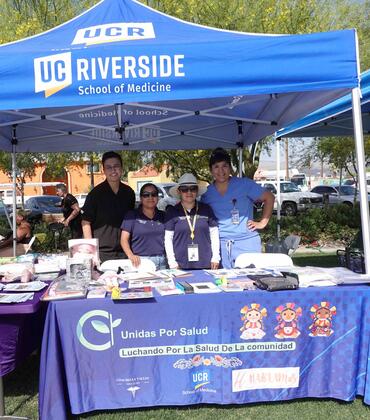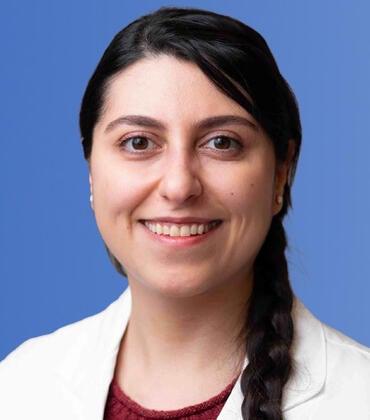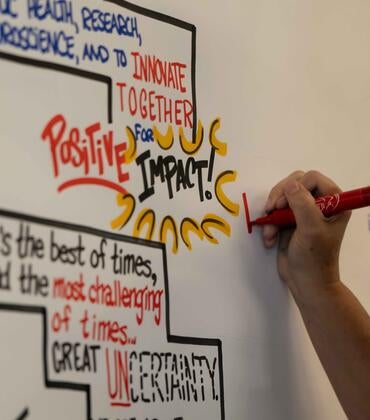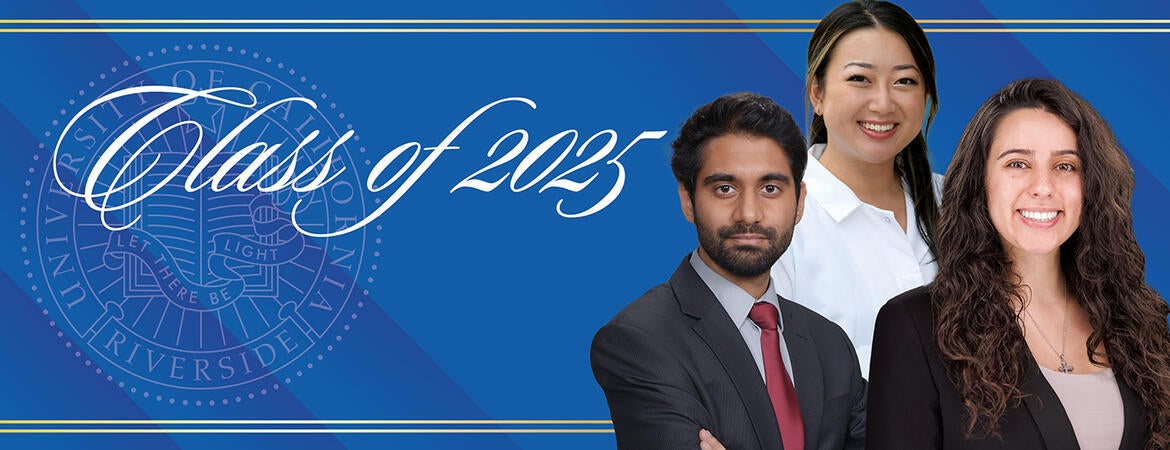
Marina Joseph: Overcoming Self-Doubt to Thrive in Medical School
A few days before Marina Joseph’s very first final exam as a medical student, her bag containing her laptop, iPad, and all her notes was stolen.
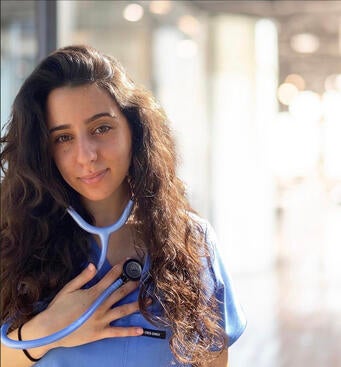
At the time, Joseph, a member of the UCR School of Medicine Class of 2025, was already struggling with self-doubt about her place as a medical student. Despite her commitment to medicine and her acceptance to the Thomas Haider Early Assurance Program, which guarantees selected UCR undergraduates a spot in the medical school class, she hadn’t known what to expect as a first-generation U.S. medical student. “You go in with this blank piece of paper where you make your dream what you want it to be,” Joseph recalled. “That's a huge blessing, in a way, to go in blind… but there also could be a distance from reality.”
Overcoming her own insecurities presented one of Joseph’s biggest challenges early in her medical school years. “I remember actually sharing this with people close to me, and a lot of them would brush over it because they couldn’t comprehend that a medical school student feels like she's not smart enough, because in their head a medical student is a smart person,” Joseph recalled.
Her self-doubt and stolen study materials left Joseph at a loss before her first major exam–but an immediate outpouring of support from her classmates and family helped her stay calm and return to studying. One person bought her a new iPad; another friend logged out of their own iPad to let Joseph use it while waiting for the new one; another dropped off flowers to brighten her day; someone else offered to take her out to lunch. “Everyone, whether it was messaging me to just make sure that I'm okay, or offering some type of financial or physical gift, so many people reached out, and to me that was beautiful,” Joseph said. “Many of these people were in the same boat as me and needed to study,” she continued. “They had all the right not to pay attention to any of the things I was going through….But to me that’s what love is.” With her classmates’ support, Joseph aced the exam.
While Joseph still felt self-doubt, she said the experience put her on the path to largely overcoming it by the end of her second year. Her mentors at the SOM, like Christina M. Granillo, PhD, assistant clinical professor of health sciences, “helped correct those thoughts and feel confident in my abilities and know that just because I don't know something, the smart person will go and learn that thing,” Joseph said. “A smart person is just one who asks questions and then finds an answer. It's not one who has answers to all the questions.”
Joseph also realized that her negative thoughts were preventing her from reaching her goal of serving the underserved, the objective that originally attracted her to the UCR SOM in alignment with its mission to improve the health of medically underserved people in the Inland Empire. “To hinder my own success and my own ability to be a good doctor means to hinder my patients from receiving quality care,” she said.
The support Joseph received from her classmates further inspired her to repay their sacrifices with her own, both for her colleagues and her future patients. “It really helped me put myself in the shoes of people who go through these unfortunate circumstances and to know that, the same sacrifices someone made for me, I want to be able to do that for others,” said Joseph, who will soon enter the family medicine residency program at Loma Linda University Medical Center in Murrieta, CA. “When you receive love, you want to pass it on.”
Anser Qazi: Advocating for Patients through Research and Holistic Care
During one of his last rotations in medical school, UCR School of Medicine class of 2025 graduate Anser Qazi met a transgender patient who had run away from home and was receiving treatment from the transitional clinic at the University of Southern California Gender-Affirming Care Program. “You could see in the way that this person was interacting with the clinic that we were their world and their home,” Qazi recalled.
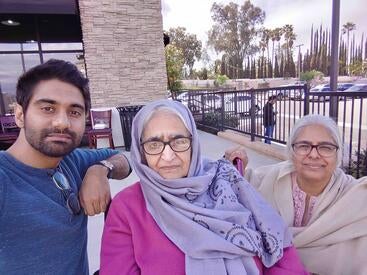
For Qazi, the experience illustrated the importance of taking the time to understand and advocate for patients, which in turn may affect whether patients follow their treatment plan. "We make that atmosphere, that connection, that resonance with patients,” he said, emphasizing the importance of listening to patients rather than simply telling them to take a medication or giving them other rote instructions. “If we fail to do that, then we've never really helped our patient out fully.”
Qazi already understood the importance of advocating for patients. As a teenager in Pakistan, he drove his grandfather to medical appointments for chronic lymphocytic leukemia and took charge of his treatment plans. The experience was Qazi’s introduction to medicine and highlighted physicians’ role in treating underserved people in his country, sparking Qazi’s interest in pursuing a medical degree.
Qazi’s focus on serving underserved communities eventually brought him to the UCR SOM. He first attended UCR as an undergraduate, drawn by its diverse student body, financial aid opportunities, and family living nearby. He was accepted into the Thomas Haider Program, which guarantees 24 qualified UCR undergraduates admission into the UCR SOM. Attending the SOM “just felt like a natural choice,” Qazi said.
As a medical student, Qazi found innovative ways to serve patients and the community through research. He collaborated with Erica Heinrich, PhD, an assistant professor of biomedical sciences, to develop an algorithm to monitor breathlessness in patients on ventilators then alert physicians or automatically adjust the ventilator settings. “There was a great need for it, especially post-COVID, since a lot of people developed PTSD and anxiety and depression post-intubation because they were breathless on the ventilator, but they couldn't verbalize it because they were sedated,” Qazi explained. The project has since been taken over by a UCR graduate student and is in the process of receiving a patent.
The research, Qazi said, also goes back to patient advocacy. “We're going to be able to catch breathlessness in people…who can’t advocate for themselves in the moment,” he said. It may also improve long-term outcomes in patients by reducing anxiety and PTSD as well as the fear of intubation. “That's what we want to see in the community, that people are embracing healthcare, they're not hesitant from it,” he said. “They know that there's technology on their side and research on their side that is able to advocate for them when they're put out.”
Qazi, who will soon begin the internal medicine residency program at Harbor-UCLA Medical Center, said he hopes to live in the Inland Empire region long term to serve the community he’s been part of for years. He’ll also continue to help care for his grandmother after his grandfather passed away several years ago. “This is what I've been doing since my grandfather was ill, and…it was just a matter of becoming a doctor officially,” Qazi said.
With his upcoming graduation from medical school, Qazi said his path feels natural. “It wasn't, oh, now you're becoming a doctor,” he said. “It was, you were already sort of a doctor, and now you have the degree, and everything fell into place.”
Angelina Lam: Embracing a Variety of Opportunities in Biomedical Sciences
Angelina Lam never used to think of herself as an artist. But after creating a piece that bridged art and her research, then presenting it in a downtown Riverside coffee shop, the 2025 PhD candidate in biomedical sciences changed her mind.
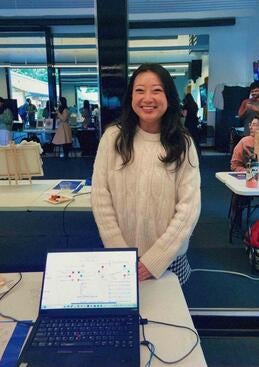
The artwork, which Lam made as part of the Artistic Expression of Original Research program, gave her distinctive insights into her research while helping her share the importance of science with community members in a new way. By assigning different notes and amplitudes to the values of each data point in her neuroscience research, Lam created a sound piece that represented her findings—and, she said, seemed more accessible to people in the community than a jargon-heavy publication.
“It really helped to reduce barriers, because I talked to people that said they don't do any science at all, but to be able to have them experience it in a different format was really cool,” Lam said. “It was really interesting to see how many people are actually, genuinely curious about the kind of work that we do at UCR and want to see our results.”
For Lam, the unique experience was just one example of the variety of opportunities available to students at UCR. In fact, she chose the biomedical sciences PhD program specifically for its interdisciplinary focus, giving students a range of experiences both within the program and at UCR more broadly.
While much of Lam’s PhD research focused on sensory selection in behavioral neuroscience using mouse models as part of the Zagha Lab led by associate professor Edward Zagha, MD, PhD, the program also gave Lam the opportunity to work as a clinical graduate student researcher. Through that experience, she discovered an interest in clinical research that benefits the community. One of Lam’s clinical research projects, in collaboration with UCR Health physician Brenda Ross, MD, investigated local attitudes toward vaccination during pregnancy. “It’s important to understand the reasons that drive people's attitudes and perceptions to vaccine hesitancy during pregnancy, and it was really interesting to hear different responses in the surveys like misinformation or concern about risk,” said Lam, who hopes to continue working on community-benefiting research projects after she graduates.
Lam also found other opportunities during her PhD program to help both UCR students and the wider community while developing her own leadership skills. She joined the Biomedical Sciences Departmental Graduate Student Association (GSA) as treasurer during her second year, later serving as president. Recognizing the isolating nature of graduate school, Lam focused in her role on increasing social support and holding social events for students to connect with each other, including a division-wide game night and social events between labs.
Lam used her GSA role to reach out to younger students as well. Partnering with the Riverside Unified School District, the GSA created an online video series promoting higher education to middle and high school students. “They could introduce our graduate students, make research more familiar, and show students what a PhD is and that it can be attainable,” Lam explained.
Besides student support and outreach, Lam helped organize annual GSA toy, clothing, and food drives to give back to people in the area. Lam’s efforts at UCR and beyond helped the association win Outstanding Graduate Student Organization at UCR in both 2023 and 2024.
“One of the things I learned in grad school was that, anything that you want, you can do,” Lam said of her variety of experiences as a biomedical sciences PhD student. “If you're going to grad school, embrace all the different opportunities that you have.”
